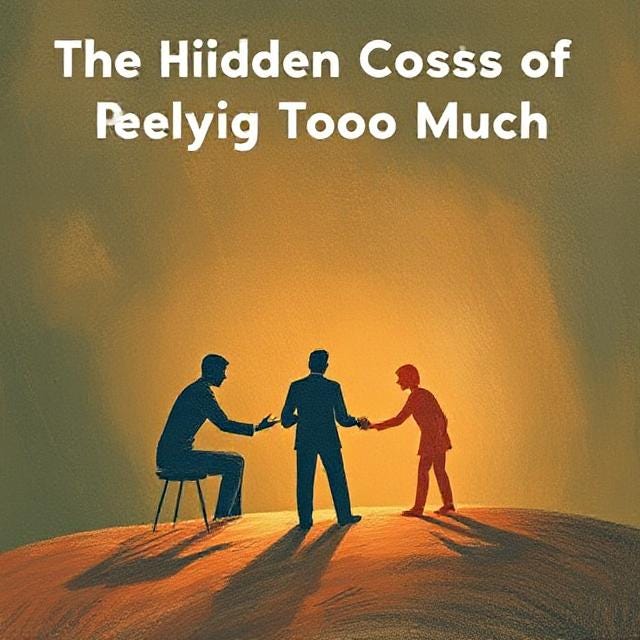DONT Depend of anyone

dont depend on anyone
Ever wonder why the happiest people you know aren’t waiting for someone else to “complete them”? They’ve figured out what most of us learn the hard way: depending on others for your happiness is like building a house on quicksand.
I used to think self-reliance meant being cold or distant. Turns out, it’s the exact opposite. True independence creates the foundation for healthier relationships and personal growth.
By the end of this post, you’ll have five practical strategies for emotional independence that won’t just change how you view self-reliance — they’ll transform how you show up in every relationship you have.
But first, let me tell you about the moment I realized just how dangerous emotional dependency can be…
The Power of Self-Reliance
Why Independence Matters in Today’s World
In a world that’s increasingly connected, true independence has become something of a superpower. Think about it — we’re constantly bombarded with messages telling us to rely on others, follow the crowd, or outsource our thinking. But here’s the truth: those who chart their own course are the ones who ultimately thrive.
Independence matters now more than ever because it gives you the freedom to make decisions based on your own values, not societal pressure. When you’re self-reliant, you don’t have to wait for permission or approval — you can take action immediately when opportunities arise.
The most successful people I know all share one trait: they’ve learned to trust their own judgment. They gather information from various sources but make decisions independently. This skill is gold in a world where groupthink often leads to mediocre outcomes.
Breaking Free from Emotional Dependency
Ever notice how some relationships leave you feeling drained instead of energized? That’s emotional dependency in action, and it’s a silent happiness killer.
Emotional dependency happens when you tie your self-worth to others’ opinions or approval. You become a passenger in your own life, letting someone else hold the steering wheel.
Breaking free starts with recognizing the pattern. Ask yourself: “Am I making this choice because I want to, or because I’m afraid of someone’s reaction?”
Next, practice setting boundaries. This might feel uncomfortable at first — like you’re being selfish. You’re not. You’re actually creating space for healthier relationships where both people stand on solid ground.
Try this exercise: spend one day making decisions without consulting anyone else. Notice how it feels. Liberating? Scary? Both? That’s your self-reliance muscle starting to wake up.

The Hidden Costs of Relying Too Much on Others
Dependency comes with a price tag most people never calculate. When you constantly rely on others, you pay with your:
- Time: Waiting for help instead of finding solutions yourself
- Growth: Missing the learning that comes from overcoming challenges
- Confidence: Eroding your belief in your own capabilities
- Resilience: Weakening your ability to handle setbacks
I’ve seen it countless times — people who outsource their thinking eventually forget how to think for themselves. They become paralyzed when faced with decisions their support system can’t handle.
The harshest cost? The opportunities you’ll never know you missed. When you’re constantly looking to others for guidance, you develop a narrower view of what’s possible for your life.

Building Your Self-Reliance Muscle
Self-reliance isn’t something you’re born with — it’s a skill you develop through consistent practice. Like any muscle, it grows stronger with use.
Start small. Choose one area where you typically seek help and commit to handling it yourself. Maybe it’s cooking a meal from scratch, fixing something around your home, or making a decision you’d normally outsource.
Create your own decision-making framework. When facing choices, ask:
- What do I truly want?
- What information do I need to decide?
- What’s the worst that could happen if I’m wrong?
- Can I handle that worst-case scenario?
Document your wins. Each time you successfully navigate a challenge independently, write it down. This creates proof of your capability that you can revisit during moments of doubt.
The ultimate goal isn’t to never need anyone — that’s neither realistic nor desirable. The goal is to operate from a place of choice rather than necessity.
Building a Supportive Network Without Dependency
The Difference Between Support and Dependency
Recognizing the line between healthy support and unhealthy dependency is crucial. Here’s the thing — we all need people in our lives, but there’s a massive difference between leaning on someone occasionally and not being able to function without them.
Support looks like having friends who cheer you on when you’re crushing your goals. Dependency? That’s when you can’t make a single decision without calling three people first.
Here’s how to spot the difference:
Support Dependency Empowers you to grow Keeps you stuck and stagnant Respects boundaries Blurs personal lines Celebrates your independence Creates anxiety when you’re alone Comes without strings attached Builds resentment over time
Cultivating Healthy Interdependent Relationships
Strong relationships aren’t about not needing anyone — they’re about choosing to connect while standing firmly on your own two feet.
The sweet spot? Interdependence. This is where you maintain your identity while meaningfully connecting with others.
Start by getting crystal clear on your values and boundaries. What matters to you? What lines shouldn’t be crossed? Communicating these upfront prevents messy situations later.
Find people who respect your independence and have their own lives too. The healthiest relationships I’ve seen are between two complete individuals who choose to share their journey, not two half-people desperately trying to become whole.
Contributing Value in Relationships
The strongest connections are two-way streets. You bring something to the table, they bring something too.
Ask yourself: “What do I offer in my relationships?” Maybe you’re the friend who always listens, the problem-solver, or the one who brings the laughs when things get heavy.
Contribution doesn’t mean keeping score or tallying up favors. It means showing up authentically and adding to others’ lives while they add to yours.
When you consistently bring value, you position yourself as an equal partner rather than a dependent one. This builds mutual respect that’s impossible to develop in one-sided relationships.
When to Ask for Help (Without Sacrificing Independence)
Even the most self-reliant people need help sometimes. The trick is knowing when and how to ask without undermining your independence.
Good times to reach out:
- When facing challenges beyond your expertise
- During transitions or major life changes
- When you’re physically unable to handle something alone
- When learning something new
The key is approaching help as a temporary resource, not a permanent crutch. Frame your requests specifically: “Could you help me figure out this tax form?” works better than “I can’t handle my finances!”
Remember — asking for targeted help when truly needed shows wisdom, not weakness. It’s actually a sign of strength to know your limits and strategically fill those gaps.

Comments
Post a Comment